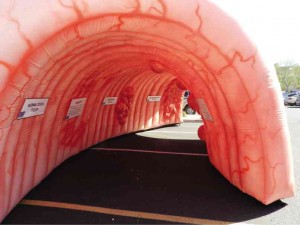Colon cancer screening can save your life

A GIANT inflatable replica of a human colon in the United States illustrates the development of colorectal cancer and help visitors gain a better understanding of how colorectal cancer is identified and be effectively treated if detected early.
(First of two parts)
This month the world celebrates Colorectal Cancer Awareness Month. This was first launched in 1999 by the Centers for Disease Control and Prevention in a campaign to promote colon cancer screening. This has been very successful in the United States that colon cancer screening rate among Americans increased from 50 percent in 2002 to 65 percent in 2012.
In the Philippines, the awareness for colon cancer among Filipinos has been limited, as compared to lung and breast cancer. Screening can save lives, but not that many people are being screened. This is the message of the celebration, and now is the time to bring this campaign to our country to educate the public.
3rd most common cancer
Colorectal cancer (involving either the colon or rectum) is the third most common cancer in the world, but only lung and breast cancer affect more individuals. Colorectal cancer (CRC) is often called the silent killer, as it is the second leading killer cancer affecting men and women, and as many patients may have no complaints. In the United States, six out of 100 people will develop CRC in their lifetime. The Philippine Cancer Society reports that CRC is No. 4 among Filipinos; breast, lung, and liver cancers are more prevalent.
CRC screening can reduce colon cancer risk by as much as 60-70 percent. CRC usually starts as abnormal growths in the colon called polyps. Over time, some polyps can turn into cancer, and thus are precancerous lesions. Screening tests are available to visualize polyps, so they can be removed before they potentially turn into cancer, or detect early cancer so cure can be achieved. The 5-year survival rate of persons affected with this cancer is 90 percent when diagnosed early, but lesser than 10 percent when diagnosed in the advanced stage.
Long process
Almost all of CRCs arise over a long period as a result of interaction between one’s genetic predisposition and environmental insults. It may take around 10 years for polyps to develop into cancer. Given the long process of this transformation, screening for polyps in people at risk can reduce the probability of developing CRC. As these polyps and early cancer usually do not cause symptoms, it is very important to promote CRC screening to the public.
Factors identified to have a strong association with CRC include a diet that has high fat (usually saturated fat), low fiber and high red meat consumption. Cooking meat may lead to carcinogenic heterocyclic amines. Fiber reduces fecal transit time, dilute carcinogens and adsorb heterocyclic amines. Risk for CRC are possibly associated with cigarette smoking, lack of physical activity, obesity, and alcohol intake.
On the other hand, aspirin, nonsteroidal anti-inflammatory drugs (NSAIDS), COX-2 inhibitors and calcium are suggested to be protective. Limited data suggest food rich in carotene (vitamin A) and vitamin C could act as antioxidants in the chemoprevention of CRC. Though environmental factors and diet might affect the formation of CRC, their exact roles remain unclear.
Risk factors that predispose to develop CRC include age, personal history of polyps or CRC, family history of CRC and preexisting diseases, like Inflammatory Bowel Disease. Age is the most common risk factor for CRC since 90 percent of cancers occur after the age of 50. The risk of an individual with a first-degree relative with sporadic CRC is increased two to three times.
Dr. Jun R. Ruiz is a Diplomate of the American Board of Internal Medicine in Gastroenterology and Philippine College of Physicians in Internal Medicine. He finished his Gastroenterology fellowship at the George Washington University and was awarded as a Kaiser Physician Hero at Kaiser Permanente. He is also the first Filipino author of the Merck Manual. He is a consultant at the St. Luke’s Medical Center and can be contacted at junruizmd@gmail.com.
